We’ve all been there; it’s three or four in the afternoon and you’re hitting the proverbial wall at your desk. Slumped over in your chair, you stare at the clock on your computer screen wondering why time seems to be going backwards.
You feel physically drained, mentally foggy, and like your body is about to collapse from exhaustion.
And you still have to finish the day, sit in bumper-to-bumper traffic, and go home to make a healthy dinner. FML, right?
Before you reach for that questionable energy drink or your seventh cup of coffee, just hold on a second. Let’s rewind your day to see if we can change the course of this miserable outcome.
What if you had a plan to fight that afternoon fatigue with foods that have been proven to give you long-lasting energy levels?
Good, I’ve piqued your interest.
It’s time to free yourself from the clutches of low energy levels and combat that fatigue with these 12 energy-boosting foods.
1. Good, Complex Carbs
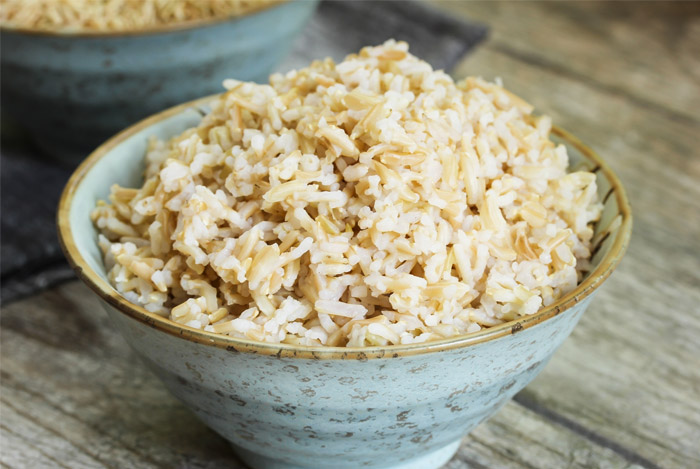 If you’re following a low-carb diet like Atkins, you may be a little more lethargic than usual. That’s because our bodies love using carbs as their main source of fuel and energy for our brains and muscles.
If you’re following a low-carb diet like Atkins, you may be a little more lethargic than usual. That’s because our bodies love using carbs as their main source of fuel and energy for our brains and muscles.
Once we start limiting that energy source, we have to find a way of constantly replacing it. Keep in mind that “carbohydrates have four calories of energy per gram”.
So as you see, carbs are not the enemy, they’re actually our friend. However, when we choose simple carbs such as pasta, white bread, and pizza, our bodies are all too eager to digest them quickly.
We experience a short rush of energy as our blood sugar levels rise, but then we go through a debilitating crash. Sound like your afternoons?
Instead, choose complex carbs that will provide you with long-lasting energy to get you through your days such as:
According to one study, when 142 people ate good carbs found in “high-fiber cereal at breakfast for two weeks, the volunteers had more energy, mental clarity, and less emotional upset than they did when they went back eating to their usual breakfasts”.
But even too many good carbs can get you into trouble. When your body can’t use all the carbs you give it, they get stored, which you definitely don’t want. Always remember to portion control.
A serving of bread is usually one slice, while ½ cup of brown rice or pasta is standard. I know it’s very easy for me to eat more than my allowed serving of whole wheat pasta if I’m not careful.
2. Chia Seeds
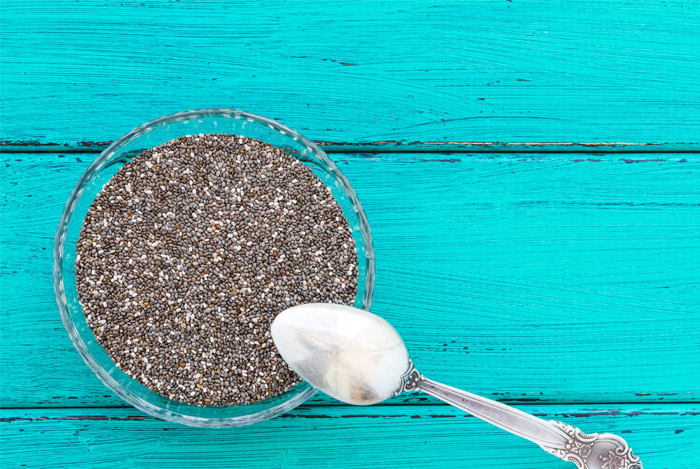 We all know that the ancient Aztecs and Mayan warriors used to eat chia seeds to quell their hunger during long treks of battle through the jungle, and there’s good reason for this.
We all know that the ancient Aztecs and Mayan warriors used to eat chia seeds to quell their hunger during long treks of battle through the jungle, and there’s good reason for this.
Chia seeds improve your endurance so you thrive on very little, but they also make your body perform better.
Here’s the skinny on just one ounce of chia seeds:
- 137 calories
- 4.4 g protein
- 10.6 g of fiber
- 4915 mg omega-3 fatty acids
Now, we’re supposed to get around 25-38 g of fiber every day – one ounce of chia seeds has between half to one-third of your daily fiber. Why does this matter?
Well, besides making you feel full and aiding in your digestion, these slow-releasing carbs actually give you sustained energy levels throughout the day.
They also contain a killer antioxidant called quercetin, which has been shown to help athletes recover and perform just as well as popular sports drinks (minus the sugar!).
In one study published in the International Journal of Sports Nutrition and Exercise Metabolism, “12 healthy but untrained subjects increased their time-to-fatigue in a cycling test by an impressive 13.2%…after seven days of quercetin supplementation”.
See why I love chia seeds?
3. Eggs
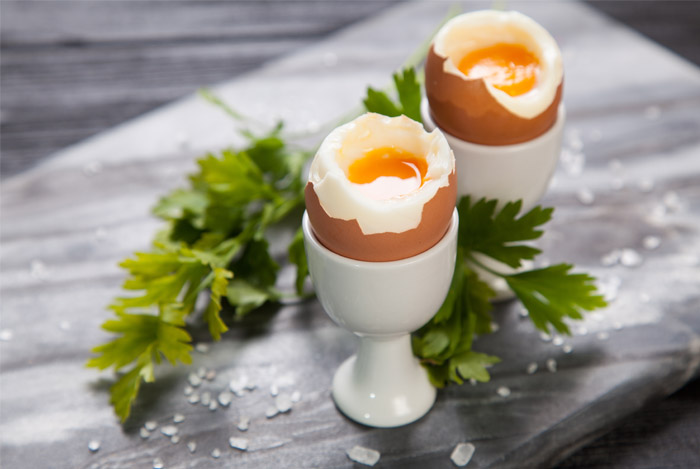 Don’t shy away from eggs because you think they’re too high in cholesterol – remember when we busted this myth?
Don’t shy away from eggs because you think they’re too high in cholesterol – remember when we busted this myth?
Eggs are a staple in my refrigerator and I love eating them any way they’re being cooked or served.
While the protein in eggs isn’t your body’s preferred source of fuel (since carbs have that honor), “protein provides a slower but longer-lasting source of energy than carbohydrates”.
Think about this: one egg contains around 6 g of protein and supplies you with all your essential amino acids.
Whether you’re cooking up one of my delicious and quick egg-based breakfasts, enjoying my avocado egg salad, or snacking on hard boiled eggs, know that you’ll be fueling your body with energy that will sustain you all day.
4. Mega Magnesium Foods
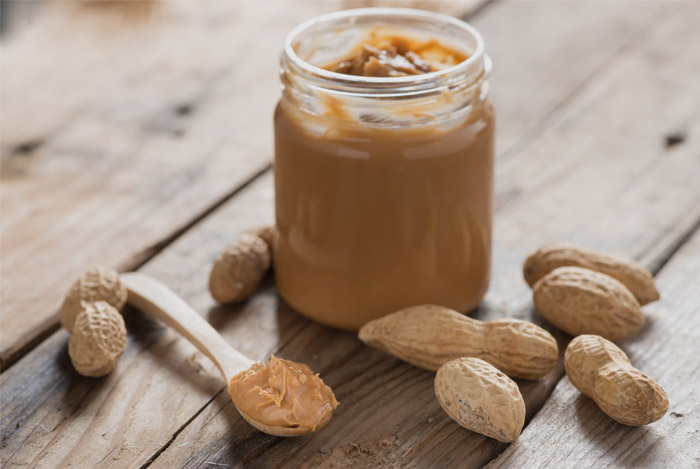 Here’s a riddle for you: magnesium is a mineral that relaxes our muscles and also helps us fall and stay asleep. But if our magnesium levels drop too low, we’re tired and feel fatigued.
Here’s a riddle for you: magnesium is a mineral that relaxes our muscles and also helps us fall and stay asleep. But if our magnesium levels drop too low, we’re tired and feel fatigued.
Seems crazy that one mineral is responsible for both giving us energy and relaxing us at the same time…
But I’m sure magnesium doesn’t see it that way. Magnesium is a player in over 300 enzyme reactions in our body! Talk about a busybody.
The ideal balance of magnesium (300-400 mg daily depending on age and gender) will help with the production of molecules known as adenosine triphosphate (ATP), which “transport chemical energy within cells for metabolism” so they have enough energy to perform all their functions.
It makes sense that low levels of magnesium cause us to feel fatigued, we’re really just starving our cells of the energy they need to work for us.
What’s even worse is that “less than 30% of U.S. adults consume the Recommended Daily Allowance (RDA) of magnesium. And nearly 20% get only half of the magnesium they need daily to remain healthy”.
Here are some of the best sources of dietary magnesium so you don’t fall into that statistic:
- 1 ounce roasted almonds – 80 mg / 20% DV
- ½ cup cooked spinach – 78 mg / 20% DV
- 1 ounce roasted cashews – 74 mg / 19% DV
- 1 cup plain or vanilla soy milk – 61 mg / 15% DV
- ½ cup cooked black beans – 60 mg / 15% DV
- ½ cup cooked and shelled edamame – 50 mg / 13% DV
- 2 tablespoons smooth peanut butter – 49 mg / 12% DV
Iron-Rich Foods
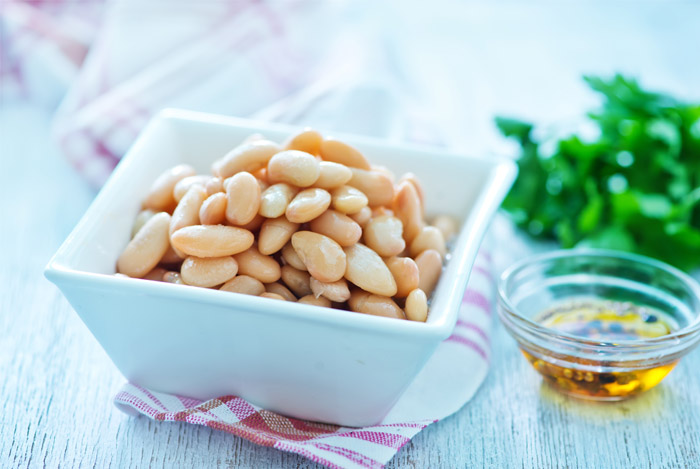 Another mineral that most people forget to take notice of is iron.
Another mineral that most people forget to take notice of is iron.
Low levels of iron can make you feel faint and tired, and can lead to you feeling like you’re going to pass out on your desk.
“If you’re deficient [in iron], you could eat the best diet and still be exhausted”, says Meridan Zerner, a sports dietitian.
Women are especially susceptible to iron deficiencies because they lose lots of it during menstruation.
Scientists from one study discovered that when women ate the most plant-based sources of iron they were “35% less likely to develop PMS than women who consumed the least”.
Symptoms of PMS include fatigue, irritability, and depression – all downers if you’re shooting for high energy levels, which is why women are encouraged to get between 15 and 18 mg of iron daily, while men are recommended just 8 mg.
If you want to keep your mental and physical stamina, opt for nutritional sources of iron such as:
- 3 ounces cooked oysters – 8 mg / 44% DV
- 1 cup white beans – 8 mg / 44% DV
- 3 ounces dark chocolate – 7 mg / 39% DV
- 1 ounce pumpkin seeds – 4 mg / 23% DV
- ½ cup boiled lentils – 3 mg / 17% DV
6. Nuts
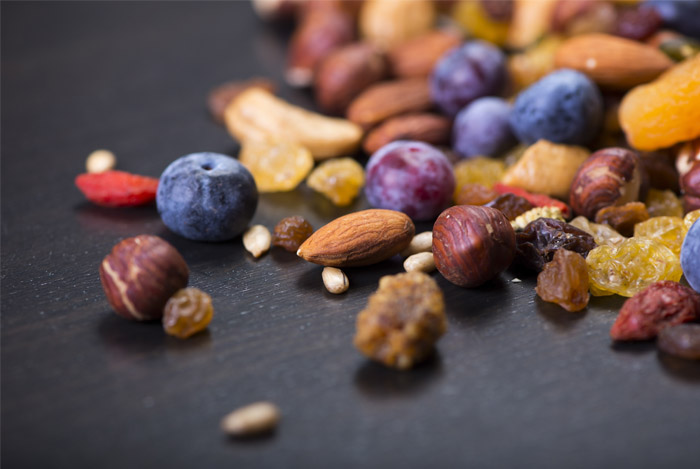 Nuts are a special food source; they contain all the best macronutrients (lean protein, good carbs, and healthy fats) without leading to weight gain when eaten according to their serving sizes.
Nuts are a special food source; they contain all the best macronutrients (lean protein, good carbs, and healthy fats) without leading to weight gain when eaten according to their serving sizes.
While their carbs give you a quick shot of energy, their fiber and protein make that energy last way after you eat them.
Pair a handful of nuts such as almonds, walnuts, and macadamias with dried fruits such as cranberries or blueberries for a quick and portable pick-me-up when you’re at your desk, leaving the gym, or running errands.
But don’t go overboard; nuts are high in calories and fat and dried fruit may contain lots of sugar. If you watch your portions you should be able to enjoy all the benefits from these two foods without the negatives.
7. Beans
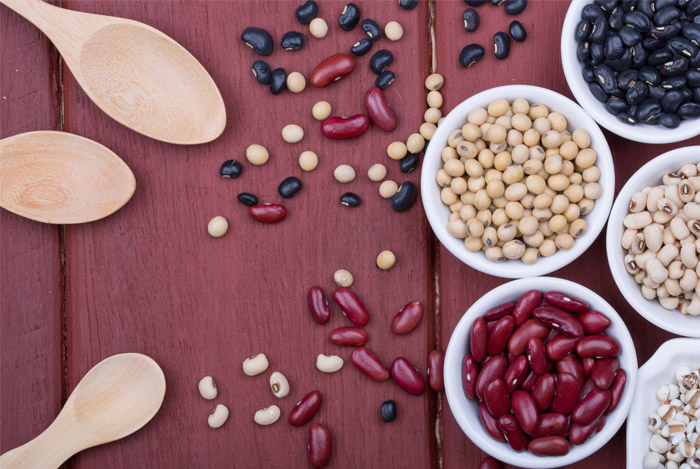 Beans made this energy-boosting list not because of their protein content (though it is impressive!), but because most of them are so high in fiber.
Beans made this energy-boosting list not because of their protein content (though it is impressive!), but because most of them are so high in fiber.
Fiber is basically carbs that aren’t digested by your body. And we know that good, complex carbs give us energy.
Fiber doesn’t necessarily give us energy, but since fiber takes longer to digest, it gives our body more time to absorb the nutrients from our foods that do give us energy.
The fiber in beans also helps stabilize blood sugar levels so you’re not on a roller coaster of up and downs. When blood sugar levels dip, you’ll likely feel tired and irritable.
Plus, beans have around a third of your recommended magnesium, which we already know we need to monitor to keep the energy department working at high capacity.
Boost Your B Vitamins
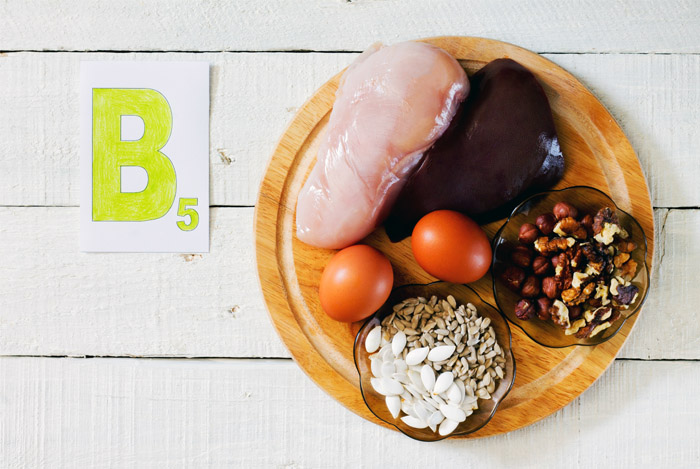 Running low on B vitamins feels like you’ll never get out of your sluggish slump. Been there!
Running low on B vitamins feels like you’ll never get out of your sluggish slump. Been there!
Arguably the most critical vitamins your body needs to keep you going, B vitamins will break down all the other foods on this list to make sure you’re getting usable energy.
Sounds like a daunting task for one vitamin, but there’s actually eight different types of B vitamins and each of them is responsible for different functions:
- B1 (thiamine)
- B2 (riboflavin)
- B3 (niacin)
- B5 (pantothenic acid)
- B6
- B7 (biotin)
- B12
- Folic acid
B vitamins are water soluble, which means we don’t store them. That’s why it’s super important to replenish your levels of B vitamins every day.
So what are your best B vitamin sources for energy?
8. Lean Pork
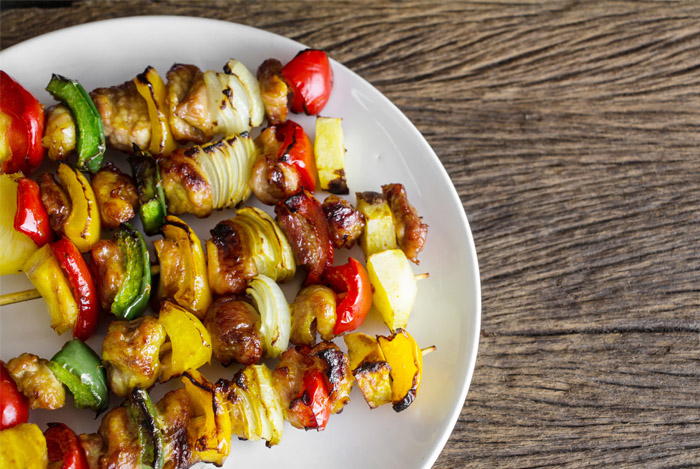 B1 is sometimes “called the ‘anti-stress’ vitamin because it may strengthen the immune system and improve the body’s ability to withstand stressful conditions”.
B1 is sometimes “called the ‘anti-stress’ vitamin because it may strengthen the immune system and improve the body’s ability to withstand stressful conditions”.
We know that when we’re stressed out, our bodies become weaker, which may cause that feeling of being down and out.
Vitamin B1 is used “for maintaining a positive mental attitude, preventing memory loss, enhancing learning abilities, fighting stress, and increasing energy”.
You only need around 1.4 mg of vitamin B1 daily. A 3 oz. serving of lean pork contains 0.95 mg of B1, or 63% DV.
9. Shellfish and Oily Fish
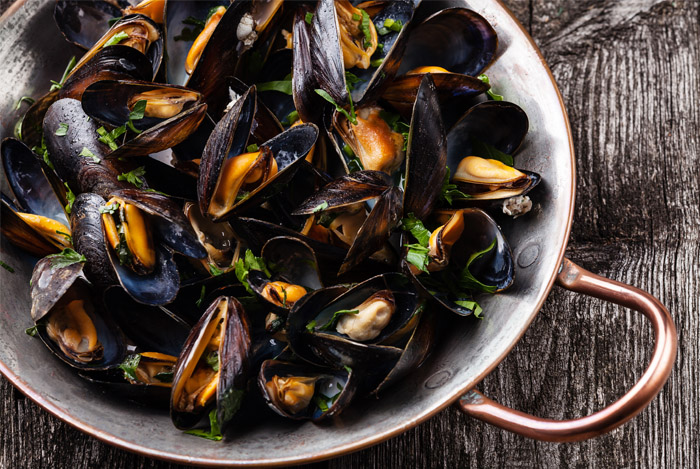 “Vitamin B12 is an excellent energy booster…a deficiency of vitamin B12 can cause symptoms ranging from mild fatigue to severe exhaustion”.
“Vitamin B12 is an excellent energy booster…a deficiency of vitamin B12 can cause symptoms ranging from mild fatigue to severe exhaustion”.
You only need 2.4 micrograms of B12 daily, but unlike other vitamins, “vitamin B12 can only be manufactured by bacteria and can only be found naturally in animal products”.
Fear not vegans: synthetic forms are readily available and added to lots of foods such as fortified soy; just check your nutrition labels to make sure you’re getting enough.
The highest concentrations of vitamin B12 can be found in cooked shellfish and oily fish:
- 3 oz. cooked clams: 84.1μg / 1401% DV
- 3 oz. mackerel: 16.2μg / 269% DV
- 3 oz. tofu: 2.0μg / 34% DV
Try snacking on smoked salmon and cucumber bites at midday to keep up your energy levels. Just 3 oz. of smoked salmon has 257% of your DV.
Don’t Forget to Stay Hydrated
According to a study in the Journal of Nutrition: “Even being mildly dehydrated (we’re talking a mere 1.5% loss of water volume) can leave you feeling foggy and fatigued”.
So add these foods to your daily diet to ensure you’ll never have to blame dehydration for your low energy levels.
10. Water
 Remember when we discussed the incredible health benefits of water?
Remember when we discussed the incredible health benefits of water?
Even though water doesn’t directly give your body energy, it facilitates all of the energy reactions going on inside of it.
The reason you feel so tired when you’re dehydrated is because your body has a hard time doing water’s job alone. Water is that totally irreplaceable queen bee at work.
H2O: such a simple, yet amazingly powerful addition to your diet – and most people just take it for granted. But you won’t now that you know adding a few more cups each day may keep you alert, focused, and fighting fatigue.
11. Watermelon
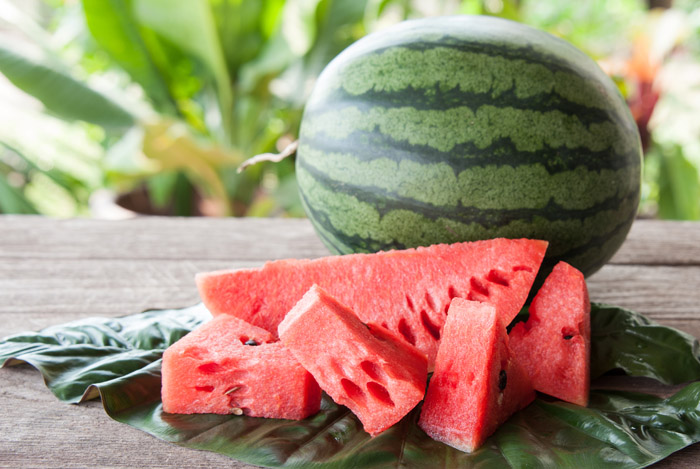 Watermelon is actually 92% water, so if you’re a bit tired of downing all those water bottles at work, make sure to keep a stash of fresh, hydrating watermelon in the office fridge.
Watermelon is actually 92% water, so if you’re a bit tired of downing all those water bottles at work, make sure to keep a stash of fresh, hydrating watermelon in the office fridge.
Watermelon also contains 5% of your daily dose of potassium per serving, an electrolyte responsible for managing your hydration levels and allowing oxygen to travel around to all of your cells.
Plus, watermelon is a great source of B vitamins such as B1 and B6, and magnesium – all players in the energy game.
You may also experience a little boost from the natural sugar in watermelon, but its slow-digesting fiber will make sure you can ride it out and not crash.
12. Cucumber
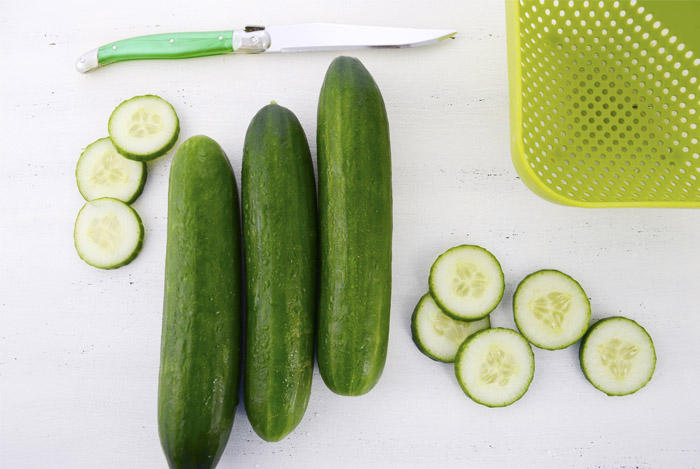 Speaking of fiber in super hydrating fruits and veggies, the fiber in cucumbers is also digested slowly so your blood sugar levels remain stable.
Speaking of fiber in super hydrating fruits and veggies, the fiber in cucumbers is also digested slowly so your blood sugar levels remain stable.
Cucumbers are 95% water, but the other 5% is rich in vitamins, minerals, and antioxidants.
Fiber and water aren’t the only benefits of cucumbers though. “The combination of alkalizing elements, electrolytes, and fluid make [cucumber] one of the world’s best foods for enhancing energy levels”.
Don’t forget to check out our article about other unexpected uses for cucumber – you’ll be pleasantly surprised to learn more about this healthy veggie.
I know it’s tempting to reach for quick energy fixes like sugary cans of soda or energy drinks packed with unhealthy levels of caffeine, but trust me: these will do more harm than good.
And you’re better than that!
The trick to beating fatigue is eating foods that provide long-lasting, slow-releasing energy. This way you’ll avoid crashing after a brief spurt of productivity.
Working out, getting enough sleep, and staying hydrated all affect your ability to fight fatigue just as much as what you eat.
When you’re riding the wave of increased energy levels, you’ll be a force to be reckoned with at work, unstoppable at the gym, and a happier person for your friends and family.
What’s your favorite way to combat fatigue? I’d love to hear what you think about these energy-boosting foods in the comments!
The post 13 Foods to Eat to Beat Fatigue appeared first on Nutrition Secrets.
http://www.nutritionsecrets.com/how-to-beat-fatigue/
No comments:
Post a Comment